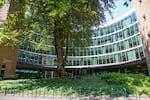Leaders at Portland State University created the Summer Bridge Scholars Program to help incoming freshmen adapt to college after an unconventional end of high school.
As the program wraps up this week, the results are mixed, with administrators promising improvements for next year.
Some students say it’s been disorganized and overwhelming. Instructors and student mentors also have concerns — from COVID-19 safety to workload and curriculum. Others praise the program for helping them make friends and acclimate before their first term in college.
The free, four-week program concludes this week, with more than 200 students participating — most of them living and taking classes on-campus.
‘Nothing like actual [college] classes’
Shaelee Singer, an 18-year-old high school graduate from Salem, said the program has not been what she and some other students had expected.
“All I hear is negative things about how they’re getting assigned way too much work and how it’s really pushing them over the edge,” Singer said.
Singer said she had taken Advanced Placement classes and already had some college credits under her belt from taking a few classes at Chemeketa Community College.
Students participating in the Summer Bridge Scholars Program can earn college credit by taking two courses — an “academic skills” course and either a writing or math course.
Singer plans to major in English and is taking the writing course.
“From being able to take college-level writing classes and everything, it’s nothing like actual classes I’ve taken at a college before,” Singer said of the PSU summer classes.

Shaelee Singer, 18, is entering PSU this fall as an English major. She says the summer bridge writing class has been disappointing.
Courtesy of Shaelee Singer
She said her writing class has been draining, and it’s been long — five-hour sessions twice a week. She also said a lot of the content has just been a refresher of what she had already learned early on in high school.
“I know that other students didn’t get the opportunity that I did to be able to take college classes beforehand and if I were in their position, I would think that all the writing classes would be this way and that it either be like way too easy or way too boring to the point I wouldn’t even want to sign up for writing classes,” Singer said.
“It’s really disappointing because as an English major, and a future educator, I would really appreciate it if the school would want to at least make the coursework a little bit more interesting for students who don’t even know their major yet.”
Shoshana Zeisman-Pereyo, director of PSU’s Learning Center and coordinator of the summer bridge program, said the format of the classes is one of the things PSU will reconsider next year.
She said both the math and writing courses are four credits each and require a certain amount of “seat time.”
“In retrospect, we realized that it probably would have been a better idea to have these classes be two or three credit hours so that we could have had a shorter class time,” Zeisman-Pereyo said.
She said the classes were designed to be in long segments, twice a week, to work for students who already had work schedules or other things to do during the week.
“Of course, we’re learning as we go,” she said. “In order to really give them the college experience … It’s not the experience of making it challenging. That wasn’t our intent, but we didn’t want to shave so much off that it didn’t feel like a college-level course either.”
COVID-19 safety concerns and a positive student case
Some PSU instructors have had difficulty with the curriculum, and questions about safety during the pandemic. Instructors didn’t want to speak with OPB directly, but some of them shared their concerns with Aaron Roussell, an associate professor of sociology at PSU and vice president for academic freedom and grievances of PSU’s chapter of the American Association of University Professors, the university’s faculty union.
Roussell is not teaching in the summer bridge program and is not speaking on behalf of the PSU AAUP.
“Their curriculum was very inflexible,” Roussell said, relaying what he heard from other instructors. “They really had no control over it.”
Roussell said some instructors who were going to teach in the program asked if they could do so remotely, citing rising COVID-19 cases.
“This situation, it just seems like the protections are so lax and the confines are so great, and people are really, they’re really not comfortable with the whole thing,” he said of the bridge program.
Roussell said the instructors he spoke with who had questioned safety guidelines in the program ended up not getting offered a contract to teach.
“A lot of these folks are non-tenure-track faculty. [Or] they’re adjuncts there,” he said. “A lot of them stitched together a living by teaching summer classes.”
Zeisman-Pereyo, the program coordinator, said there was not enough interest from students to warrant more online sections of classes.
“This program was always intended to be in person,” she said.
Zeisman-Pereyo said there are two online sections for each of the courses, and none of them are full.

Portland State University Library
Hanin Najjar / OPB
Concerns about COVID-19 safety are not unwarranted.
Coco Paton, an 18-year-old student in the program, learned she had COVID-19 during the program’s third week. Paton is isolated in her PSU dorm room and has continued the program online.
She said, before she got sick, the safety precautions were confusing.
“A lot of different [resident assistants], they’re called ‘peer mentors,’ have given us different rules and stuff and it was really, really confusing, and a lot of people have been getting in trouble,” she said.
“It’s just been weird because we’re allowed to be in the dining hall with over 100 people without masks, super close to each other, eating and people share drinks and food, and that’s not a problem for them,” Paton said. “But when we come together in smaller groups with masks in an enclosed area, we’ve gotten in trouble.”
Zeisman-Pereyo assures that the program has taken “100% appropriate measures” to keep students, instructors and student-mentors safe.
She said an email was sent out to every student in Paton’s class and that the class has gone fully remote. She said per CDC guidelines, every person who was exposed will need to get tested.
“From the standpoint of the classroom, everything has been very safe. I have not heard one complaint from instructors. Everyone has been fully wearing masks,” Zeisman-Pereyo said. “Where issues could potentially be arising is scholars making their own decisions not to wear masks outside of the classroom, and we can’t control what people do on their own personal time.”
‘We didn’t realize that this was what we were being asked to do’
The summer bridge program relies heavily on ‘peer mentors’ — current students at PSU — for a variety of duties. Though, there’s also a sentiment among them that the job demands go beyond what they signed up for.
One peer mentor told OPB the program’s job requirements were unclear, and that they are being asked to do things they’re not prepared for. They also did not know it was a requirement to live on-campus, in the dorms, to work for the program.
In addition, the mentor said they are sometimes tasked with leading the “academic skills” course, which includes discussions about time management, study strategies and dealing with anxiety. They said the mentors must also organize social events for the students.
“We’re on-call 24/7,” the peer mentor said, who did not want to use their name so as not to jeopardize future employment with PSU. “We’re running around going to class, trying to fit in time to eat, and we are then going to another class or putting together an event.”
Zeisman-Pereyo said living in the dorms was both part of the job description and in the application for the peer mentors.
She said she had not heard about some of the other concerns and will be reaching out to all of the mentors to follow up.
Mostly, the mentor said, they are worried about the incoming freshmen in the program — a significant number of whom are coming to PSU with a lower grade point average, and many of whom are students of color.
The mentor said they have seen some of the students crying in class or in the dorms.
“I’ve gone to college as a freshman, and I’ve been in class with freshmen, and I’ve never seen this amount of overwhelm,” they said. “We’re worried that they will drop out of this program, of college. It doesn’t matter how much you say, ‘College isn’t actually like this.’ It’s burning them out so that when they come to college, they won’t have anything left.”
Addressing stress is one of the main reasons the program was created, Zeisman-Pereyo said, and she said students’ mental health is a major concern.
“When you couple the stress that students usually experience and layer COVID on top of that, plus being away from home for the first time, we are bound to see scholars who are feeling worn out,” she said.
Zeisman-Pereyo said the hope is that the program will help the students “gain coping skills, knowledge of PSU resources, strong help-seeking behaviors, and learn how to talk to their instructors about their needs.” She said she’s already seen that play out a bit with some students talking with both program leaders and instructors to get more clarity on their schoolwork and how to be successful in classes.
Student positive experiences: ‘I got a head start’
The program has not been a negative experience for every student.
AKShata Jha graduated from Westview High School in Portland. She had taken some college-level and advanced courses in high school, but she still said the summer bridge program helped her get more academically prepared for going to PSU, and for her at least, the work isn’t too much.
“I really think it’s doable,” Jha said. “It’s just dependent on how you manage your time.”

AKShata Jha, 18, says PSU's Summer Bridge Scholars Program has helped her make new friends before the fall term. That's especially helpful after she spent her whole senior year of high school online.
Courtesy of AKShata Jha
An even bigger plus for her was feeling more ready socially. She spent her entire senior year of high school online.
“It’s been one week and I think I have more than 10 friends,” Jha told OPB at the beginning of the program. “I really do think this was like the best thing that could’ve happened, especially in the year of 2021.”
Another student in the program, Nicolas Obligacion, said he feels similarly. He’s aiming to eventually go to pharmacy school and is focusing on science classes this fall, but he’s taking the writing course in the summer bridge program.
Obligacion is from Seattle, and his main goal this summer was to learn the city and the PSU campus and to make new friends.
“I really focus on summer bridge being kind of like getting acquainted with the city and meeting new people instead of kind of getting a sense of school, academic-wise,” Obligacion said.
Though, Obligacion said, the summer bridge program did give him a “head start” on learning after spending the end of high school online.
“I wanted to come in and kind of get a hold of what it was like to do in-person classes again instead of online because online has been a thing for me since over a year and a half [ago] in high school. … If I didn’t do summer bridge, it would have been extremely hard for me to adapt to that when it came into the fall,” he said.

Nicolas Obligacion says the summer bridge program has given him a "head start" for the fall. He's from Washington, and he said it's been helpful to get to know the campus and the city.
Courtesy of Nicolas Obligacion
Planning for next summer
Even though the program was created because of the pandemic, coordinator Zeisman-Pereyo said, it will continue next year, because it will be something students need, regardless of the pandemic.
“The reality is that there are inequities within our education system that existed well before COVID. They’re going to exist long after COVID,” Zeisman-Pereyo said. “And as long as we know that these inequities exist, and we are admitting students to PSU, we want to make sure that there is a safety net for these students and that we are allowing them to start off on the right foot.”
Zeisman-Pereyo is anticipating changes, such as scaling back the credit hours and class length for the math and writing classes.
“[We’re] really seeing that the scholars are loving the socialization piece, which is a huge goal of ours. So, how do we build in more of that?” She said, “but, at the same time, not detract from the academics because we do have a very strong purpose in our academics.”
Zeisman-Pereyo said there will be a “full-blown assessment plan” for when the program concludes, including surveys and focus groups. She said each of the summer bridge students are now “coded” in PSU’s system, so that advisors can connect with them, and track their grades, as they progress through college.
“I’m really proud of everybody who’s been able to get through this and recognize that, you know, it is a growing process and a learning process,” she said.
